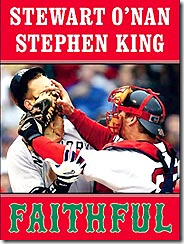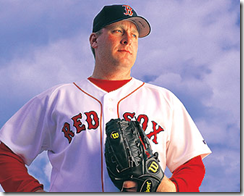I finished reading Faithful: Two Diehard Boston Red Sox Fans Chronicle the Historic 2004 Season by Stephen King and Stuart O’Nan, and while I enjoyed the bo0k, I have a few quibbles with it as well.

As a Yankees fan, I knew that reading the book would be difficult. The 2004 baseball season was the worst in Yankees history. After taking a 3-0 lead over the Red Sox in the battle for the pennant, the Yankees became the only team in baseball history to lose the next four games and thus lose the series.
This would be heart wrenching regardless of the opponent, but the fact that it was the Red Sox made it exponentially worse.
Still, I wanted to read this book. I’ve read everything else that Stephen King has ever written, and I adore the man.
While I haven’t quite read everything Stuart O’Nan has written yet, I like what I’ve read so far. More importantly, he was my professor for a writing class at Trinity College, so I got to know him a little bit and liked him a lot.
Even though I knew it would be hard to listen to these men describe the events of that 2004 postseason, I thought that I would be happy for them as well. As a native New Englander who grew up near Boston, I understand the suffering the Sox fans had endured. They deserved to win. At least this is what I had convinced myself of when I dove into the book.
I have three complaints about the book, and they all pertain to O’Nan.
First and most surprising, O’Nan engages in conspiracy mongering several times in the book, implying with all seriousness that baseball might be fixed. A remarkable confluence of events seem (in his mind) to be too dramatic and convenient to be anything but orchestrated, and he says as much more than once. King actually dismisses these claims at one point in the book, and rightly so. Like King, I find this kind of conspiracy theory nonsense to be exactly that:
Nonsense. But I know there is a small but vocal minority of sports fans who feel this way.
Yet when the long haired, loose-lipped Cowboy-up Red Sox of 2004 overcome a 3-0 deficit against a corporate team with twice the payroll that has embraced the moniker of the Evil Empire with enthusiasm, there is not a single mention of conspiracy theories to be found.
This annoyed me. If you’re going to imply that the fix is in several times over the course of the baseball season, you can’t ignore what would seem like one of the most orchestrated moments in the last 100 years of baseball.
Second, O’Nan is less than magnanimous when it comes to the Yankees. King has no love for my beloved team, but he is not mean-spirited about the team, either, He does not call them cheaters or question their character. O’Nan does so repeatedly, and it is not necessary.
Lastly, the nicknames that O’Nan uses when discussing the Red Sox players in the book made me bonkers. Nicknames have always been a part of baseball, but O’Nan takes it to an entirely new and truly bizarre level. Most of my friends are Red Sox fans, but I never heard them refer to Mark Bellhorn as Marky Mark, Pedro Martinez as Petey or David Ortiz as El Hefe (especially since Ortiz already has the often-used nickname Big Papi). It makes no sense. Was O’Nan inventing these nicknames himself, or did he hear some inebriated bleacher creature use these names and co-opted them for the book.
A good nickname is a thing of beauty. Naming your utility infielder after a former Boston-based hip hop musician turned serious actor is an act of stupidity.
Then again, I’m a diehard fan of the New York Yankees who died hard in October of 2004, so perhaps I am biased.




